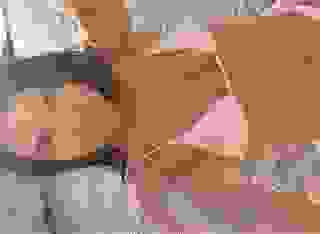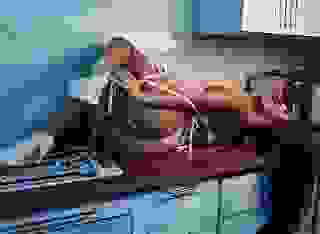Note: You can change font size, font face, and turn on dark mode by clicking the "A" icon tab in the Story Info Box.
You can temporarily switch back to a Classic Literotica® experience during our ongoing public Beta testing. Please consider leaving feedback on issues you experience or suggest improvements.
Click hereKyle also worked through the internet, for some publishing contractor. He was harder to figure. He was always talking about Sharon or Nelson and especially Mo; they were coworkers. By his late twenties, he was working directly under the company president. He said once, "She's preparing me to run the company in a few years." Jill and he were not hurting for money, but neither did they seem rich. "Not a lot of money in being a book editor for a small company. Enough, though," Kyle said. "For now."
Ayla found some papers Kyle wrote in magazines. She pointed one out to me about To Kill a Mockingbird. I hadn't realized how deeply he read that book! He was comfortable in the publishing and critical worlds. Kyle, who destroyed my flowers rather than get tagged, had become an intellectual for a living.
Kyle was proud of Gil, proud to be his brother-in-law. It was a mutual respect.
Gil loved sitting around the table with us all, and now with his girls included. He was used to being left aside, assumed to be too nerdy or intelligent. Somehow it didn't matter in this family. Gil was a welcome part of us, due to Ayla and Kyle.
Our family was better for Kyle. He brought competitiveness and brotherliness. But Kyle had suffered a bit from his discombobulated family. He'd developed or inherited a deep-seated and fundamental insecurity. At the bottom of it, I think he lacked confidence in himself.
I thought Jill saw it (I know Ayla did; we spoke of it several times before and after Jill and Kyle married), and perhaps she saw it not as a factor but a flaw. I saw it as part of what made him good; I should have spoken to Jill openly about it. I thought it made Kyle more sensitive, sensitive in that way of the compassionate and kindly. Kyle was tough, solid, and determined, but he was much more than that; Kyle had an ability to feel with a depth rare in men or women. Kyle was compassionate.
He cried openly when Jill miscarried, as he talked to Dan and me on the phone, feeling guilt for not being with Jill during that awful crisis. Dan was moved; he talked of how good and loving Kyle was toward Jill, and I agreed. Almost every decision was for Jill's benefit: where to live, what car to buy, what's best for her career, etc. She noticed his regard and always acted in love with him.
He went to pieces when he discovered the affair. Perhaps he blamed himself for not being a good enough husband. It would be his way. Somehow he felt he'd let her down. He was quiet for the months Jill deployed, drinking, Ayla was sure. I hoped he was not doing that or turning to loose women or a frivolous relationship. Those have lasting repercussions. Ayla just shrugged when I voiced those fears.
I didn't know why Jill had the affair. Her moral failure was mine as a mother. I believed my children should be good, WERE good. I wanted my kids to be the good ones in any situation.
I welcomed my grandchildren to our home that day we learned of her death; they were red-eyed and not themselves. I kissed my surviving daughter.
*
Mallon Pinckney Franklin Robison Eddy, mother of Kyle Franklin, narrating
"Thomas?" I was trying to reach my ex. My first ex,Tom Franklin.
"Yeah? Who... Mally! I'd know that voice anywhere," Thomas said. He hated that I called him Thomas, which was why I did it. He'd not heard from me since Kyle's wedding, so he ignored it.
"Tom, I have some bad news. Kyle just called me. Are you there?" I said. He was very quiet, which for Thomas usually meant he was asleep or someone was sucking his dick.
"Yeah, Mally, bad news. What?"
I heard his labored breathing and opted for the second likelihood.
"Kyle's wife, Jill. She was killed, with the Marines. Remember she was in the Marines?"
"Oh no," he said. I knew he'd pay attention to that. Thomas might have trouble attending during a suck-off, but he'd wake up at the death of a pretty girl he knew. He and I had watched Kyle play with Jill and her older sister growing up; when we divorced, I got Kyle and stayed in Sky Grey with him. But my mom really raised Kyle; I moved away for work and remarriage, and I decided his friends were the most stable part of his life, so when Mom volunteered to care for him, it worked out. I never saw him without Jill or her taller sister with him, and the Kinnisons treated him like a son, too.
"How's Kyle handling it?" he asked, a more appropriate thing to say than he might have come up with.
"He was calm on the phone. He said she and he were separated. I don't know what about. But she died. He'll get back to us when he knows more in a few days, probably."
"I always liked Jill," he said. "Remember when she saw me that once, NOT in my boxers?" He laughed, sadly, remembering standing in the kitchen one morning with a little girl at the back door... and then stopped with an inadvertent catch in his voice, an unwanted sob, choked up. Tom felt the loss, and I remembered why I loved him. "Why didn't he call me himself?" Thomas asked, when he regained control.
"His number for you is old. I got this one from your one girlfriend, the one you brought to the wedding... Bree Lynn?"
"Bree... Yes!! I remember her now." He paused, pensive perhaps. "Awful, huh Mally? I remember Jill waking me up calling his name so many mornings. She was a good kid." He paused for a few seconds. "We didn't have much of a marriage, but..." he started and didn't finish.
"Yeah, but Kyle came out of it. And Jill was a cutie. I'll give him your number. Oh, do you have a pen? His number is..."
Chapter 7: Childhood's End
Kyle Franklin narrating
I only had direct experience with one death. It was in February of my sophomore year in college.
"Grandma? You home?" I came home from Miami U most Fridays to spend the weekends and see Jill. Grandma knew I was coming, and usually she'd have some cookies and milk or coffee ready. She made it a point to be there. We'd talk at the kitchen table about school or Jill or Mom and Dad.
She expected me, but I called and she didn't answer. "Grandma? Grandma?" It was unusual for her not to answer. Grandma was one of those older ladies who ruled her home. No one came in without notice.
I found her sprawled on the kitchen floor.
"Grandma! Come on! Grandma!" I called out forcefully, knowing she couldn't hear. I wasn't panicky, I knew it was too late. Her eyes were open. There was no movement of breathing, no substance behind her eyes. There was no blood. It was her heart, I was sure.
I went to my knees beside her. She was cold to touch. I kissed her forehead, but it was too cold. "Ah, Grandma," I said gently, and sat heavily beside her, my hand on her hair. I leaned against the cabinet.
It took me a minute to decide to move. I called Mom then, sitting beside her dead mother. She told me what to do once she realized Grandma was really dead and no amount of CPR would bring her back.
I called 911 and told a woman there that Grandma was gone. Police and paramedics would respond, the woman said. She wanted me to stay on the line until the police arrived. I went to the front door and opened it, not worrying about letting the cold air in. I went back to Grandma and sat back down. My left hand gently stroked her hair and cheek.
It was only a few minutes before I heard a siren in front, and then a woman called out, "Police!"
I told the 911 lady, "The police are here," and I hung up. I called out, "In the kitchen, Officer." She found us, saw Grandma with my hand on her head, and her countenance softened. "I found her like this, Officer. A few minutes ago." I kissed Grandma on the forehead one last time, and got up.
I called Jill, who was walking home from the high school. Her parents came over just before I hung up, having seen the police car and its lights. The paramedics arrived then. Jill joined us on the front porch steps in the cold winter sun. We didn't say much.
I cried with Jill's head on my shoulder. Dan Kinnison put his hand on my shoulder.
Grandma left me her savings, her house, and her rarely-used car. I was not rich, but suddenly student loans could be paid off, graduate school would be afforded, and I had some security. I would have given it all away to have Grandma back; she raised me more than Mom had. She made me feel I was worth her time...worth the last of her time.
*
Kyle Franklin narrating
Since Jill was two years younger than I and I didn't have a pressing job prospect as I got my bachelor's in English, I enrolled in a master's program at an unusual graduate school in Cincinnati. I completed the program there in 18 months, taking advantage of Jill's summer Marine "cruises" to concentrate on the degree. Five months before she graduated with a bachelor's, I had a master's degree in literature.
The next months were a whirlwind. We had a wedding to prepare, a future to plan, each other to love. We loved. People saw it. It was the first thing anyone noticed about us. We didn't hide it. Only sex was private, and a wonderful private.
She graduated with a bachelor's degree in accounting, was commissioned a second lieutenant in the Marine Corps Reserve, married me, moved into Grandma's house with me for a month, and then she moved to Quantico and an apartment off base. I stayed in Ohio for another week, arranging the sale of Grandma's house (to that same police officer who answered my 911 call, actually). I joined Jill in Dumfries, Virginia.
*
Kyle Franklin narrating
We made the Marine Corps work for us. Jill would have schools for that first year: The Basic School that all new Marine officers attended, followed by a school in her field. I applied for writing workshops, seminars, and programs during those times she'd be either away or very busy. The workshop I attended in late autumn that first year led to my first job in writing and gave direction to my career.
It was the third week of a six week workshop at Duke that I was approached by the workshop director, Sharon Ackerman. Her resume included work for several different book publishers, who occasionally contracted with her still. Dr. Ackerman asked me to meet her at Starbuck's one early morning in Durham.
"Your paper on To Kill a Mockingbird is being debated among the instructors," Dr. Ackerman said. "Barnham says he'd like to publish it next month." I was afraid my introductory essay "Mockingbird and a Child's Heart" was silly. I wondered why it hadn't been returned with the other introductories at the beginning of the second week.
Barnham's Literary Monthly was very well-respected among publishers and certain writers. It was mostly criticism of established novels; it was not a journal for novels hot-off-the-presses. I was glad my venti dark was not too sweet.
"It's controversial in some way?" I asked.
"No, just a whole different way of looking at the novel, one that hasn't been considered before," she replied, "and in this business, fresh is rare." I thought it was a conventional essay extolling the novel's virtues, particularly its adult themes and adolescent language.
"Most of the ideas were synthesized from others," I said. "I think the notes document them pretty well." I was defensive. I didn't understand why she had asked to meet me. I'd not heard of other students being asked to breakfast.
She smiled. "I understand you're wary. When you write things, you become fair game for every reader and even non-reader who wants to comment. Especially the dreaded anonymous. No, I'm here to ask if you'll come to the spring symposium at Wake Forest. We'd like you to present and criticize. Lead some groups."
She sipped her grande sugary milky frothy thing. I sipped my venti dark, with enough half-and-half and just a bit of stevia.
I smiled as I realized she was offering a position. "You're asking me to be an instructor?"
"Yes, with close guidance. You'll be the only one without a Phd. Actually, you'll be my assistant. You'll evaluate and comment in the small groups we use at Wake, and make a presentation on James Jones's novels that you've read. And we'd like you to present the ideas from your Mockingbird paper. We've been very impressed with your evaluations of Miss Malone's short story, and Mr. Katudnik—did I say that right?—Katudnik's essay on James Jones's Some Came Running."
"Does it pay?" I asked. I was living in a dorm at Duke during the week and commuting back to Dumfries to see Jill every weekend. It was a four hour drive, but Jill was worth going home to. No doubt. Saturdays and Sundays were wonderful that fall.
"Yes. Not much. You'll be taking a burden off me. And I'm hoping you may join us in a new venture. We'll talk about that later, after Wake Forest. You have a master's?" she asked.
"Yes. In literature. From Union Institute in Cincinnati."
She was nodding. "Good. I know Union, not exactly mainstream! I may have a position for you, if all goes well. You'd be able to work from home, wherever that is. There might be some travel, but infrequent."
I nodded. "My wife's a second lieutenant in the Marines. She expects Camp Lejeune after Quantico."
She shook her head. "Hard on you. My husband was in the Navy after med school. Six years. Any kids?"
I shook my head. "No. We're waiting until she's in her thirties. Then we'll see."
Dr. Ackerman nodded and sipped. I took a gulp of my still-warm coffee.
"Well, after this workshop, I'd like to send you occasional stories for editing. Sort of an introduction to a position working for publishers. Then, after Wake Forest, we'll see about the full time. We'll take it slow to get you more experience," she said.
I was excited. "I'd like that, Doctor," I said. "It sounds interesting, and along the lines I was hoping, frankly."
She nodded and finished her drink.
Barnham's published my essay under a different title that December. It generated some approval and some disagreement. Mr. Barnham was very happy with the comments and interest. Dr. Ackerman sent me a chat.
"The essay's a success. Some of my students are debating it. One decided you're a 'fatuous old slob of a nobody.' I informed him that wasn't the sort of criticism we encouraged. I said, 'He's not old at all.'"
I laughed when I read that. "Thanks for sticking up for me," I replied. I knew she was laughing in Chapel Hill.
"Please edit the attachment, reasonable time. Correct grammar, and include an essay discussing characterization, plot, other elements."
Ayla found my essay at Barnham's online, somehow. I think she Googled my name and the essay, now called "New Perspectives on Lee's Mockingbird," turned up. She sent an email to me: "Mom and Dad are properly impressed to discover you are finally doing something they understand. And making some money?"
I replied, "Precious little money so far, but I may have a real job editing soon. Fingers crossed."
I took the job to heart. I found myself commenting and criticizing hopeful authors. Somehow, Dr. Ackerman got a hold of their papers, either in class or through a publisher. I was that editor who could give unbiased criticism for her, and they'd not know me. Each time, I received a critique of my work from Dr. Ackerman.
I felt beaten up after several of these criticisms of criticisms. I took every negative thought to heart, and finally I told Dr. Ackerman.
She responded with a long email about how she was building a new kind of business and wanted me to be part of it. "I understand about the criticism; that's how all authors feel. But I have big plans for you, if you tough it out," she said. "I'm very pleased with your progress."
I learned that good writing was very hard. It wasn't just a stream of thought. Good writing was work and work didn't guarantee success.
As Jill's time at Quantico was coming to a close, I attended the Wake Forest symposium for writers, a one week schedule of meetings and small group discussions. I presented lectures on my ideas of To Kill a Mockingbird and James Jones's war novels. I gave snap criticism of various one page essays in meetings with the authors, mostly my own age or older, some much older.
"How old are you, Kyle?" Dr. Ackerman asked.
"25, just," I said. She was quiet.
"I think that'll work," she said. "Dr. Murray was impressed with the Jones lecture," Dr. Ackerman informed me.
"Good. I don't remember a Murray," I said. I'd lectured fifteen men and one young girl and they'd criticized every statement. It was another kind of beating.
"She was the woman," she said. Her eyes were twinkling.
I stopped, startled. She could see my disbelief. "She's a Phd? What is she, fifteen?" I asked. I remembered her because a girl having interest in war novels was unusual, and I'd assumed she was a talented undergrad invited to attend. When I met her, she'd just said a name, and I thought she was very young to be in this symposium. I literally thought her 15 years old. But she certainly knew the novels.
Ackerman laughed. "She's 22. A very close family friend of mine. Brilliant. Maureen Murray. Call her Mo. The only thing holding her back is she needs more years to read more literature. She was hooded two months ago at UNC."
I remembered that that was when Gil was there for his award.
"I'm surprised," I said. She was a kid. Pretty, tiny, but a spark in her eyes. "She said that The Thin Red Line was an allegory."
She laughed. "You'll get used to her. I want her to work with you in a few months."
So I found work in my field, and the position grew quickly over the months and years. Sharon Ackerman might be a big woman, but she moved quickly and gracefully developing her company. Dr. Murray and I became internet coworkers, and I came to enjoy our work chats.
Chapter 8: Publishing and Personnel
Kyle Franklin narrating
"I intend you to take over from me someday," Sharon said to me.
"Not soon, I hope," I said.
She smiled. "Kyle, you're 28, you've made this company your early career, and we now have nine other editors. Professional Publications Underwriters is doing very well. But my heart's not getting any better, and my husband demands I slow down. So, I'd like you to take over most of my supervisory duties over the next two years. You'll be Managing Senior Editor. It will cut down on the number of authors you actually edit, but you'll be able to monitor the other editors and make sure the company keeps on the right path."
"What about Mo? And Nelson?"
"Nelson's too old, too set in his ways, and avoids dealing with things. He puts off telling authors that something must change, and lets them go on too long without accepting advice. And he antagonizes some of the agents. Mo is not ready. She's 25, STILL looks like a teenager or a child, and she doesn't have the temperament. She needs time to socially grow into her intellect. She told me to select you for that very reason."
Mo. It was so easy to consider her a child, yet she had a prescience granted to few of any age. Her writing was not just impressive. I thought she'd write a great novel someday. We talked weekly by phone, texted daily or more when we discussed manuscripts and editing. We met in chat some days to discuss manuscripts and authors. "Mo is special," I said. I'd known her three years now, but only in our business. She never confided or spoke of things but editing.
Sharon nodded, looking at me thoughtfully. Mo had lived with Sharon for some years in college, during her adolescence. They had an almost mother-daughter relationship, and Sharon remained close to her parents, who were academics themselves.
"Remember how I had you handle the Smith crap?" she asked.
I remembered very well; it had only been two months before. Barb Smith had written a fairly good novel about the Civil War, and Sharon assigned the book to one of our women editors, Nancy Willensong. Nancy was 38 or so, fairly attractive, and married to the father of her three children. Barb and Nancy met secretly and became lovers. Nancy's husband sued us for it. I was put in charge.








